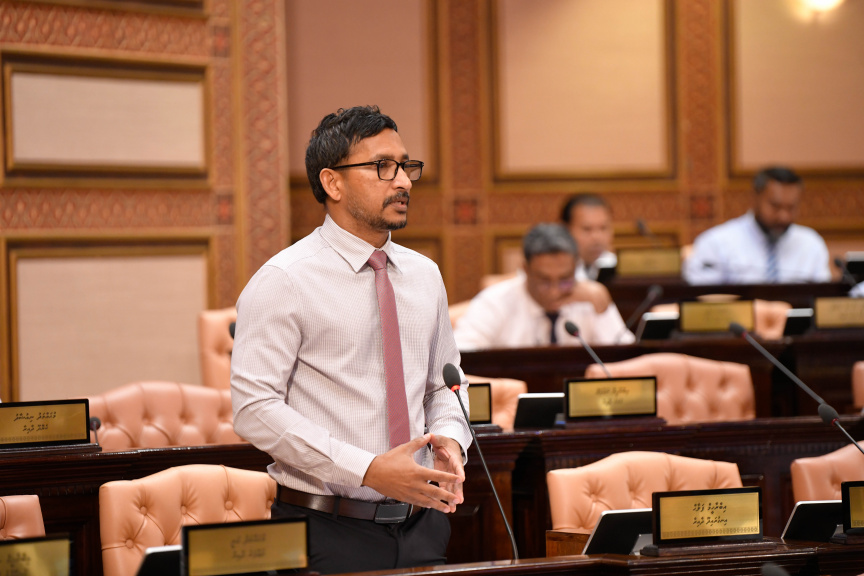
Inguraidhoo MP Ibrahim Falah. (Photo/People's Majlis)
Ibrahim Falah, the leader of People’s National Congress (PNC), voiced confidence on Wednesday that the ruling party will achieve a landslide victory in next year’s local council elections, sweeping up at least 80 percent of seats.
He made the remarks during the parliamentary debate on Wednesday morning on the Decentralization Committee’s report on amendments proposed by the government to the Decentralization Act – changes that the main opposition Maldivian Democratic Party (MDP) alleges is designed to curtail the powers of local councils, including in matters of recruitment of staff, lease of land and lagoons under the jurisdiction of councils, and run developmental projects.
Taking part in the debate, the Inguraidhoo representative said that councilors spend the last year of their five-year time busy campaigning for an additional term.
Falah said the amendments are important in order to keep a check on practices such as unnecessary hirings that take place close to the elections.
“They [the MDP] know that, by the grace of Allah, PNC will, without a doubt, win 80 percent of the local council elections next year. It will be our councilors there,” he said.
Referring to statements released by multiple councils voicing their opposition to the planned changes, Falah alleged that the councils were bribed to issue the statements.
“I know this for a fact. Around 20 to 25 councils called yesterday and said MDP is offering money to issue statements against this,” he said.
The PNC used its clear majority in the Decentralization Committee to push through the amendments without any changes on Tuesday night. The only opposing votes came from the sole MDP parliamentarian who sit in the committee; Keyodhoo MP Mohamed Niushad.
The bill outlines five main amendments:
Local Authority Company Operations: These companies would be prohibited from engaging in economic activities already undertaken by private enterprises in their operating islands. Their work must be essential for rural infrastructure development, and projects would require an investment exceeding MVR 10,000,000. Conflicting businesses would be discontinued within 90 days of the amendment's enactment.
Rent from Public Service Allocations: Councils would be barred from charging rent for land or buildings allocated to parties providing basic services to the public.
Revenue Allocation: Councils would receive revenue after deducting any state taxes, and if they have not paid for public services for over six months.
Bank Account Maintenance: Councils would be required to maintain bank accounts according to Ministry of Finance procedures and provide statements upon request.
Restrictions in Final Year: If a council's term is 365 days or less from expiration, certain actions would be restricted without adherence to norms set by the Ministry of Finance and the Local Government Authority (LGA). These include:
Recruitment of contractual or long-term employees for council offices.
Lease and grant of land, lagoons, and reef areas under council jurisdiction.
Initiation of new development projects not specified in council development plans.
The MDP, which introduced the decentralization system during its first administration in 2010, and amended the law again in 2019 to grant councils greater financial autonomy, has slammed the proposed amendments as an attempt by the government to concentrate powers and silence the voice of the people.
Several councils, including those in Fuvahmulah City, Kulhudhuffushi City and L. Gan, have issued statements protesting against the planned changes.